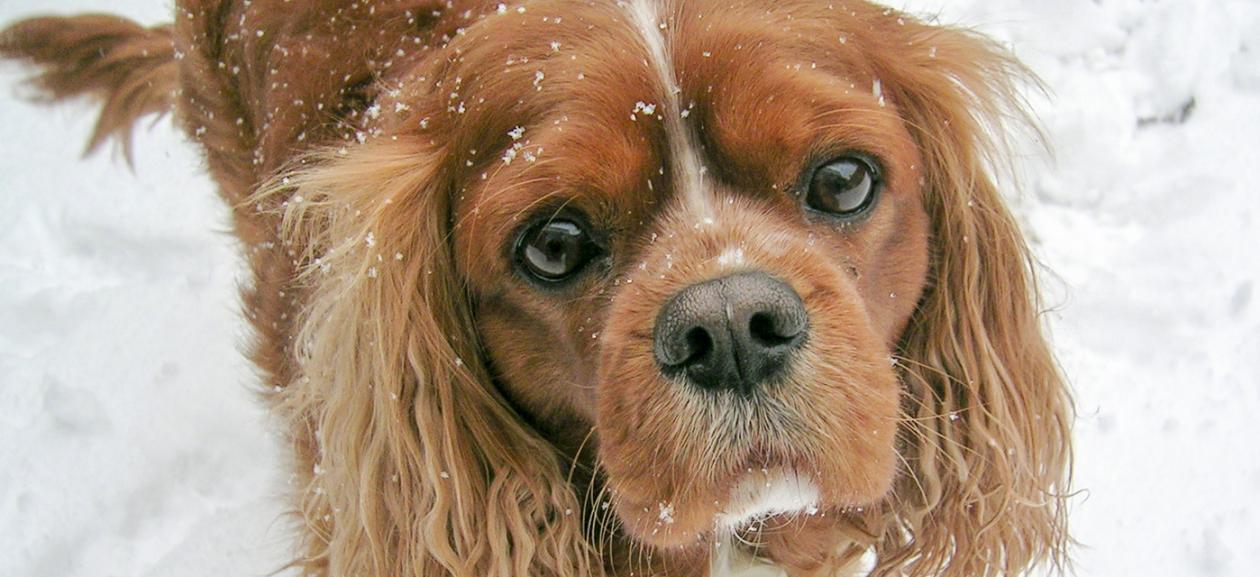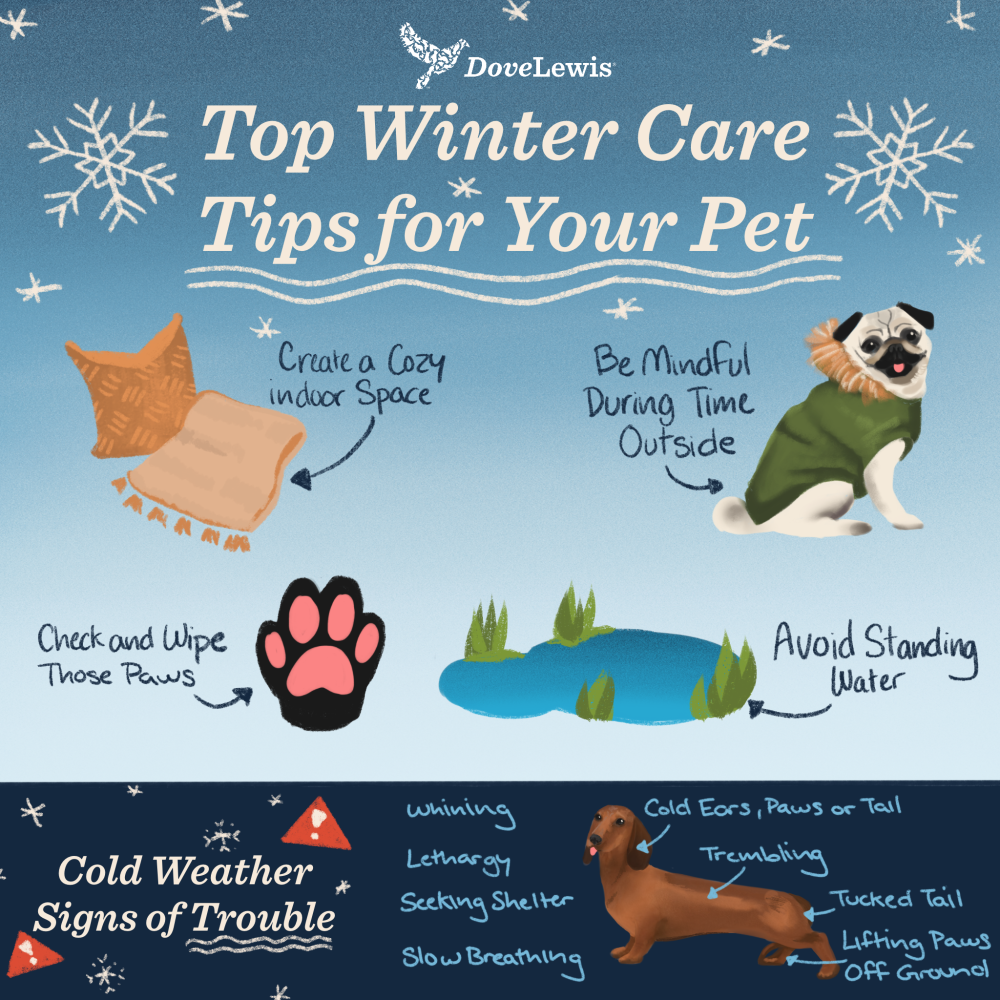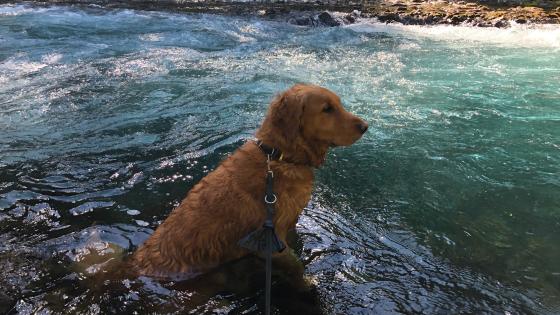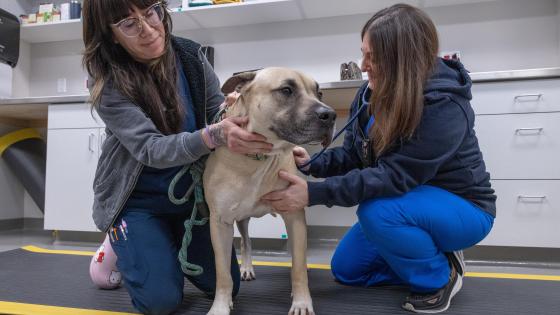
Top Winter Care Tips for Your Pets
When you think of weather safety with your pets, you may naturally think of leaving animals in hot cars during summer. But did you know that cold weather poses a serious threat to your animals as well?

Download Social Media Infographic
Create a Cozy Indoor Space
Winter often means more time spent indoors. Create a warm and comfortable space for your pets, complete with a cozy bed or blanket. Make sure the area is away from drafts and cold spots, giving your best friend a safe retreat from the winter weather.
Layer Up for Outdoor Adventures
If your pets enjoy outdoor activities, consider investing in a warm, weather-appropriate pet jacket. This is especially important for short-haired dogs or smaller breeds who may be more sensitive to the cold.
Watch Those Paws
Check your pet's paws frequently to check for signs of injury or damage, such as cracked paw pads or bleeding. After each walk, take a moment to dry your pet’s feet and stomach to remove ice, salt, and chemicals. Protect your furry friend's paws with pet-safe booties to prevent exposure to ice, snow, and harmful de-icing chemicals. You can also prevent the buildup of ice between their paw pads by carefully trimming excess fur.
Be Mindful During Time Outside
Just like in warm summer weather, it is important to be mindful of chilly temperatures and how they can affect your pup. Keep an eye on your pet during winter walks and shorten them if needed. A general rule to remember is, if it’s too cold for you it’s too cold for your dog.
Avoid Standing Water
Standing water, like puddles or lakes, can cause digestive issues for your pet and may even carry parasites or toxins. When outdoors, make sure your pets don’t take a drink of any standing water, and remember to bring fresh, clean water for your pet.
Watch Out for Winter Chemicals
Chemicals used to melt snow or protect gardens in the winter are dangerous to pets. Keep a close eye on pets when they are outside and store all chemicals out of reach. Wipe your pet’s feet, legs, tails, and stomachs when returning from walks so they don’t have a chance to lick off any potential toxins that may have stuck on them.
Balanced Nutrition
During the winter season, pets can burn more energy to stay warm. Adjust their diet, as needed, providing high-quality and well-balanced nutrition. Consult with your veterinarian to ensure their dietary needs are met during the colder months.
Don’t Forget About a Vet Check-Up
Schedule a winter checkup with your veterinarian. This is an excellent time to address any concerns, update vaccinations, and discuss preventive measures for common winter-related issues, such as dry skin or joint stiffness.
Keep Your Pet Hydrated in Cold Weather
While it might be colder, ensuring your pets stay hydrated is still very important. Sometimes, the dry indoor air can contribute to dehydration. Always have fresh water available for your pets.
Don’t Leave Pets in the Car
We all know that hot cars pose a threat to pets, but cold cars are dangerous as well. It can act as a refrigerator in cold weather and can rapidly chill your pet. Animals that are young, old, ill, or thin are particularly susceptible to the cold and shouldn't be left in a cold car.
Cold Weather Signs of Trouble
Cold weather can affect your pet before you even realize it – frostbite and other forms of cold injury may not be fully apparent until much later. Watch for any warning signs that your pet is too cold.
Signs that your dog is too cold include:
- Trembling
- Slow breathing
- Lethargy
- Difficulty / slower moving
- Whining
- Tucked tail
- Seeking shelter
- Lifting paws off the ground
- Cold ears, paws, or tails
Long-haired or thick-coated dogs tend to be more cold-tolerant but are still at risk in cold weather. Short-haired pets feel the cold faster because they have less protection, and pets lower to the ground may become colder faster because their bodies are more likely to encounter snow or ice.
Quick Action Saves Lives
If you believe that your animal is ill or may have ingested a toxic substance, contact your local veterinarian or the ASPCA Animal Poison Control Center at 1-888-426-4435.
If your pet needs care, call your primary veterinarian if they are available or call DoveLewis at 503-228-7281 for help if you see any signs of pet distress including sudden changes in behavior, depression, pain, vomiting, or diarrhea. We have veterinary technicians available 24/7 to help.
Recent Posts
Paws on the Trail: Hiking Safely and Happily with Your Adventure-Loving Pet
Keeping safety in mind is essential to ensure a successful and enjoyable hiking adventure. So, lace up your hiking boots, and let's unleash the adventure!
Marijuana Toxicity in Pets: What You Need to Know
As availability of marijuana increases in the Portland area since legalization, so have the number of marijuana toxicity cases treated at DoveLewis. Our doctors warn pet owners of the potential risks to their dogs and cats if marijuana is ingested in any form.




